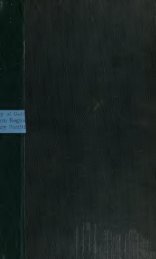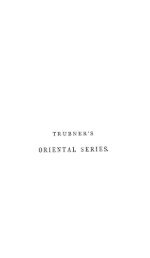Untitled
Untitled
Untitled
You also want an ePaper? Increase the reach of your titles
YUMPU automatically turns print PDFs into web optimized ePapers that Google loves.
3^ ,<br />
" SECONP DISCOURSE. ON POETS<br />
small-stoned, and luscious, s& that you wduld say they contained<br />
no earthly elements. A cluster of Kalanjari grapes sometimes<br />
'<br />
attains a weight of five maunds, and each individual grape five<br />
dirhams' weight, they are black as pitch and sweet as sugar, and<br />
one can eat many by reason of the lusciousness that is in them.<br />
And besides these there were all sorts of other delicious fruits.<br />
So the Amir Nasr ibn Ahmad "<br />
sawr, Mihrgan and its fruits,<br />
and was mightily pleased therewith. Then the narcissus began<br />
to bloom, and the raisins were plucked and stoned 1 in Malin,<br />
and hung up on lines, and packed in store-rooms and the Amir<br />
;<br />
with his army moved into the two groups of hamlets called Ghura<br />
and Darwaz. There he saw mansions,.of which each one v^as like<br />
highest paradise, having before it ,a garden or pleasure ground<br />
with a northern aspect. There they wintered, while the Mandarin<br />
oranges began to arrive from Si'stan and the sweet oranges from<br />
Mazandaran and ; sp they passed the winter in the most agree-<br />
able manner. ,.,<br />
When [the second] spring came, the Amir sent the horses to,<br />
Badghis and moved his camp to Malin [to a 'spot] between two<br />
streams. And when summer came and the fruits again ripened,<br />
Amir Nasr ibn Ahmad said, "Where shall we go for the summer ?<br />
For there is no pleasanter place of residence than this. Let us<br />
wait till Mihrgan." And when Mihrgan came, he said, " Let us<br />
enjoy Mihrgan at Herat and then go"; and so from season to<br />
season he continued to procrastinate, until four years had passed<br />
in this way. For it was then the heyday of the Samaniari prosperity,<br />
and the land was flourishing, the kingdom unmenaced by<br />
foes, the army loyal, fortune favourable, and heaven auspicious ;<br />
yet withal the Amir's attendants grew weary, and desire for home<br />
arose \vithin them, while they beheld the king quiescent, the air<br />
of Herat in his head and the love of Herat in his heart; and in<br />
the course of conversation he would . v compare, nay prefer Herat<br />
to the Garden of Eden, and would exalt its charms above those<br />
2<br />
of a Chinese . temple *<br />
So they perceived that he intended to remain there for that<br />
summer also. Then the captains of the army and nobles of the<br />
kingdom went to Master Abu 'Abdi'llah Rudagi' 3 than whom<br />
,<br />
there was none more honoured of the king's intimates, and none<br />
whose words found so ready an acceptance. And they said to<br />
him, "We will present thee with five thousand dinars if thou wilt<br />
contrive some artifice whereby the king may be induced to depart<br />
1 For this meaning of munaqqa the editor refers to the artxle Zabtb in the<br />
TvkfatKt-M'ffmatin of Muhammad Mii'min al-Husayni. For an account of this<br />
work, which was completed in A.D. 1669, see Fonahn's Zur Qtiellenkundt* der<br />
Persischen Medizin^ pp. 89-91.<br />
2 Or "Chinese Spring." See n. 2 on p. 22 supra.<br />
3 See Ethe's excellent monograph and his article in the Encyclopaedia Britannica ;<br />
p. 62 of \\utJ.R.A.S. for January, 1899 ;<br />
and Note XIV at the end, second paragraph;








![La religione di Zarathustra nella storia religiosa dell' Iran [microform]..](https://img.yumpu.com/15970820/1/151x260/la-religione-di-zarathustra-nella-storia-religiosa-dell-iran-microform.jpg?quality=85)


